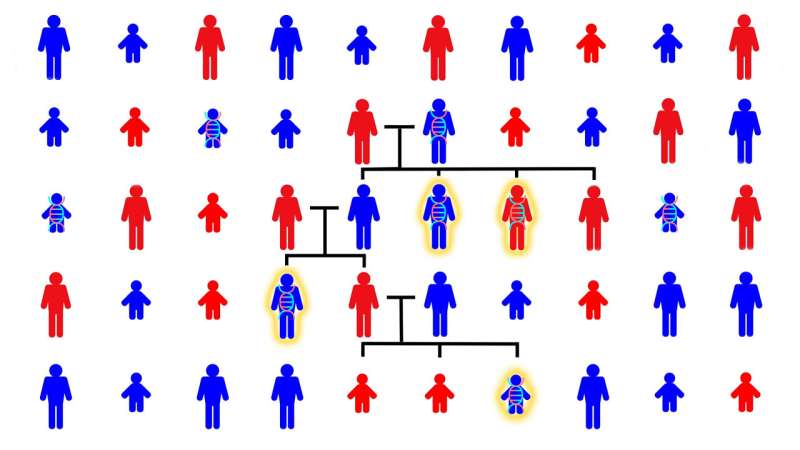This article has been reviewed according to Science X's editorial process and policies. Editors have highlighted the following attributes while ensuring the content's credibility:
fact-checked
peer-reviewed publication
trusted source
proofread
Siblings with autism share more of dad's genome, not mom's

Cold Spring Harbor Laboratory (CSHL) researchers have flipped the script on autism spectrum disorder (ASD) genetics.
Scientists long thought that siblings born with ASD share more of their mother's genome than their father's. But CSHL Associate Professor Ivan Iossifov and Professor Michael Wigler have now shown that, in many cases, it's dad who might be playing a bigger genetic role.
Autism spectrum disorders cover a range of neurological and developmental conditions. They can affect how a person communicates, socializes, learns, and behaves. ASD may also manifest as repetitive behaviors or restricted interests. In the United States, it affects around one in 36 children.
"There are children diagnosed with autism who are high functioning," Iossifov says. "They have a completely productive life, although they have some minor troubles in social interactions, as most of us do. But also, there are children diagnosed with autism who never learn to speak, and they have definitely a difficult life."
Over the last two decades, CSHL scientists have led a multimillion-dollar effort to uncover the genetic origins of autism. They discovered thousands of genes that, when damaged, may cause a child to be born with ASD. But their work was not able to account for all cases of ASD. So Iossifov and Wigler set out to find the missing sources.
The duo analyzed the genomes of over 6,000 volunteer families. They found that in families that have two or more children with ASD, the siblings shared more of their father's genome. Meanwhile, in families where only one sibling had ASD, the children shared less of their father's genome. While the discovery reveals a new potential source of ASD, it also poses a provocative question. Could other disorders play by the same genetic rules?
No one is sure how dad's genome makes its mark on children with ASD. But Iossifov has a couple interesting ideas. He thinks some fathers may carry protective mutations that fail to get passed on. Or fathers may pass down mutations that trigger the mother's immune system to attack the developing embryo. Both theories offer hope for parents of children with ASD and other neurological disorders like schizophrenia.
"Our future research is exciting," Iossifov says. "If one of those theories or two of them prove to be true, then it opens different treatment strategies, which can, in the future, affect quite a lot of families."
In addition, this research offers helpful tools for educators and therapists. It may allow for earlier diagnoses and a better overall understanding of autism.
The research is published in the journal Cell Genomics.
More information: Mathew Wroten et al, Sharing parental genomes by siblings concordant or discordant for autism, Cell Genomics (2023). DOI: 10.1016/j.xgen.2023.100319





















